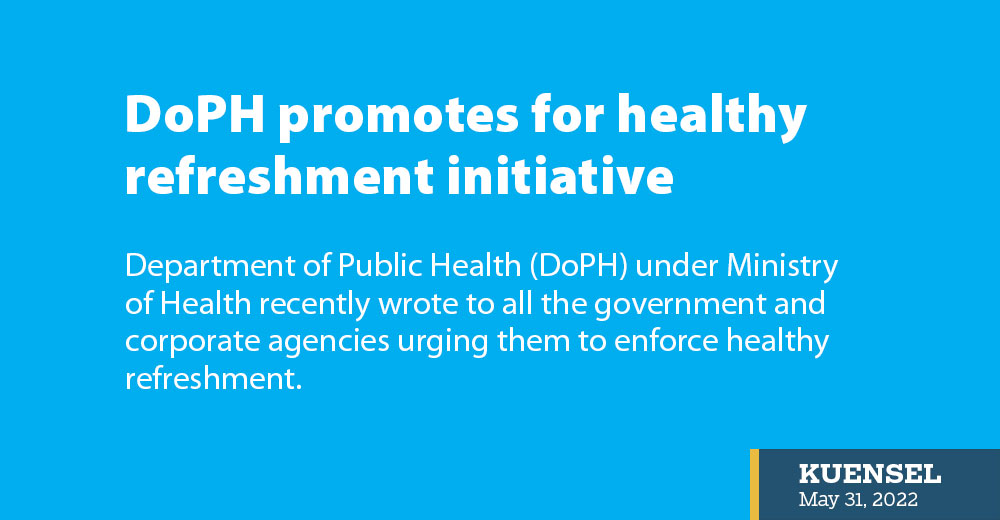Nima Wangdi
Department of Public Health (DoPH) under Ministry of Health recently wrote to all the government and corporate agencies urging them to enforce healthy refreshment.
In the letter, the department also requested the focal persons of the agencies to sensitise healthy refreshment in their own organisation.
The department conducted sensitisation meeting for the focal persons on healthy refreshment earlier.
The nutritionist and programme officer of the national nutrition programme, DoPH, Hari Prasad Pokhrel, said Bhutanese dietary habit is mostly skewed towards carbohydrate, which contributes to increasing non-communicable diseases. “This also leads to under nutrition and micronutrient deficiencies.”
Dieticians say that the Bhutanese people mostly consume rice and potato that is rich in carbohydrate. There is also high intake of salt, while fruit and vegetable intake is minimal.
Fruits, vegetables, legumes, nuts, yoghurt, curd, and low-fat milk are recommended for healthy refreshment.
During the sensitisation workshop for the focal persons, which was conducted on May 24, participants were asked to switch to healthy refreshments and meals during official meetings.
Health officials will visit the offices randomly and assess the compliance.
The non-communicable disease risk factors study, STEPS survey of Bhutan 2019 has found that 33 percent of people were overweight and 11.4 percent obese.
It was also found that 86.4 percent of the people do not consume five servings of fruits and vegetables as recommended by the World Health Orgaisation (WHO).
The study showed that the mean intake of salt is 8.3 grams per person per day, while WHO recommends only five grams.
“These unhealthy lifestyles lead to increased morbidity and mortality from non-communicable diseases. Studies have found that non-communicable diseases account for 69 percent of all deaths in the country,” the survey reported stated.
National Nutrition survey of Bhutan 2015 showed a huge prevalence of anemia in the country. “About 43.8 percent of anemia is among children who are six-59 months, 34.9 percent in reproductive aged women, 31.3 percent among adolescent girls and 27.3 percent among pregnant women.”
Officials from the department also urged the focal persons to incorporate healthy meals and snacks in the annual quotation.
DoPH’s officiating director, Rixin Jamtsho, earlier said our health system could be burdened with NCDs in future if we don’t take proper and timely measures today. He said that public health must be taken care in order to take care of the NCDs.
He said that the ministry would also conduct similar sensitisation meetings with dzongdags, thrizins, gups and gewog administrative officers.
According to Health Bulletin 2021, NCD is one of the major public health concerns in the country. Bhutan started implementing the WHO Package of Essential NCD (PEN) protocol in 2009 and the People Centered Care-PEN HEARTS project, an improved version of PEN Protocol from 2019.
The Bulletin shows that in 2020, in every 10,000 people, there were 250.9 people out of 1,000 suffering from hypertension, 82.1 suffering from diabetes, 34.6 from alcohol liver disease, 15.9 from depression, and 19.9 from cancer.


